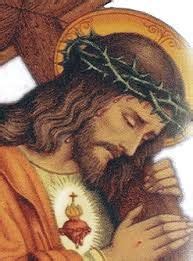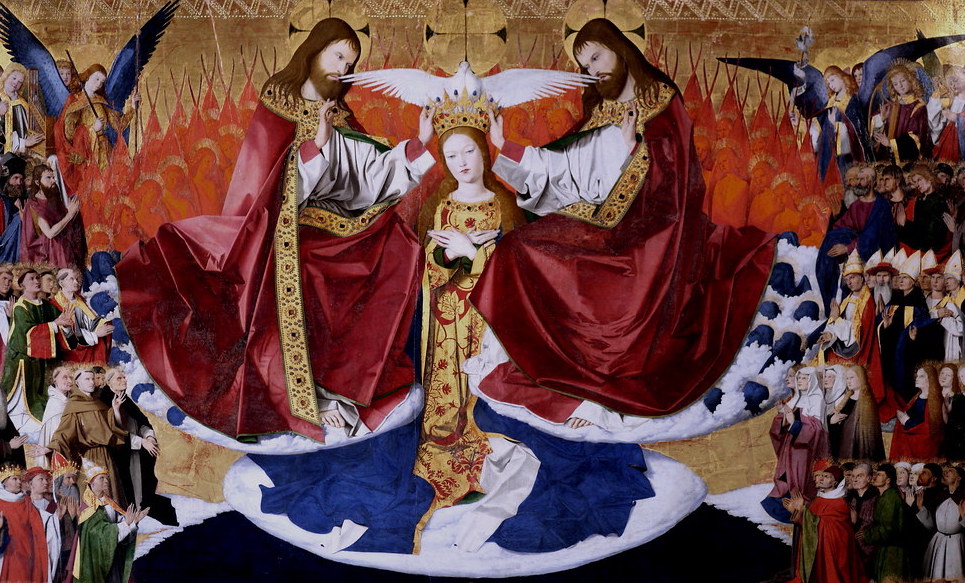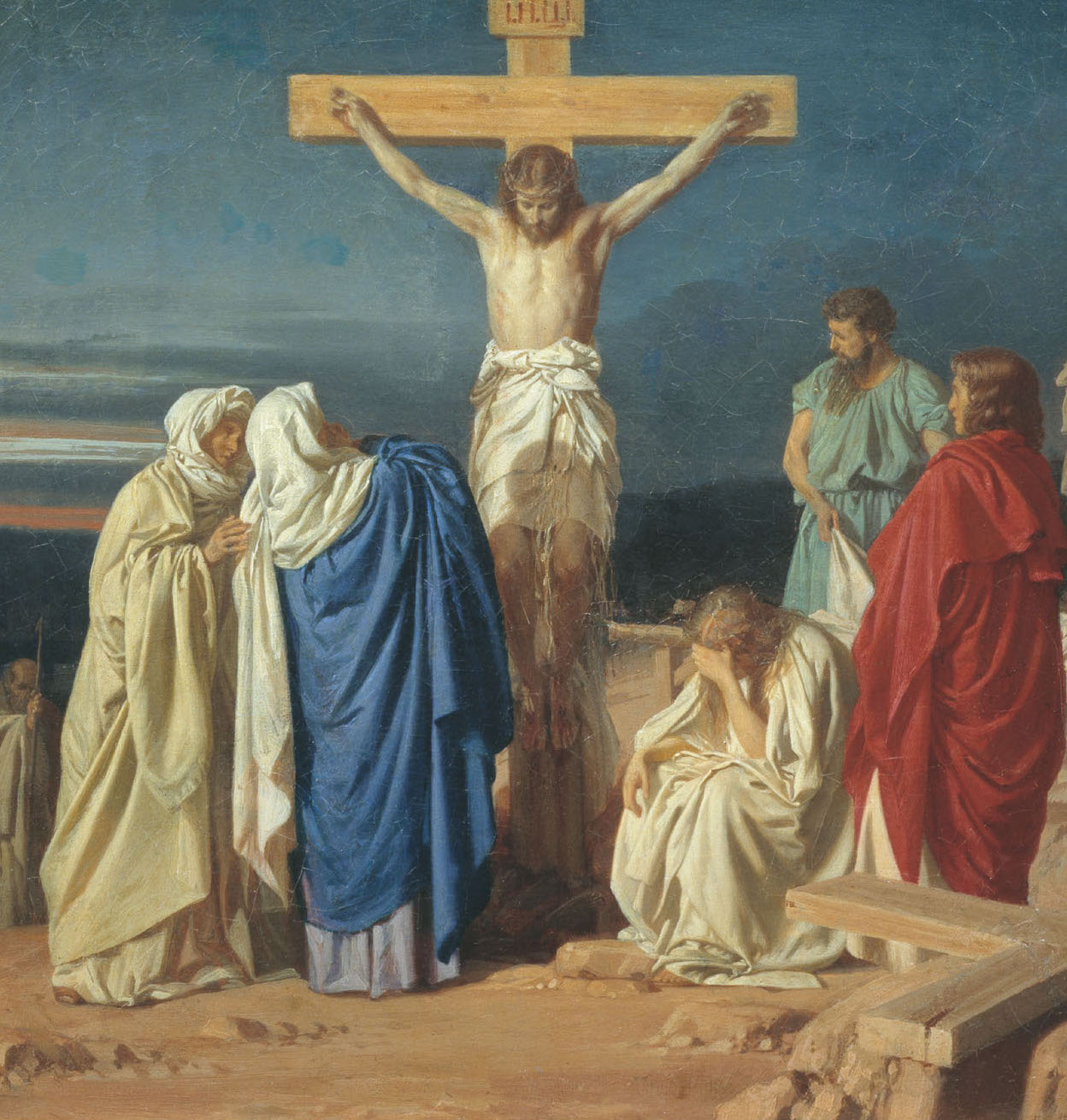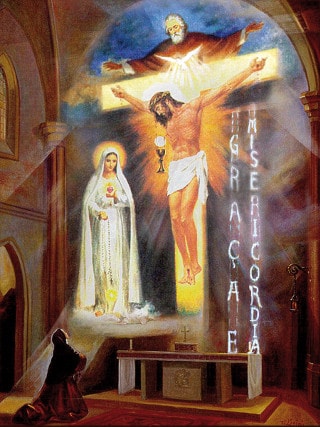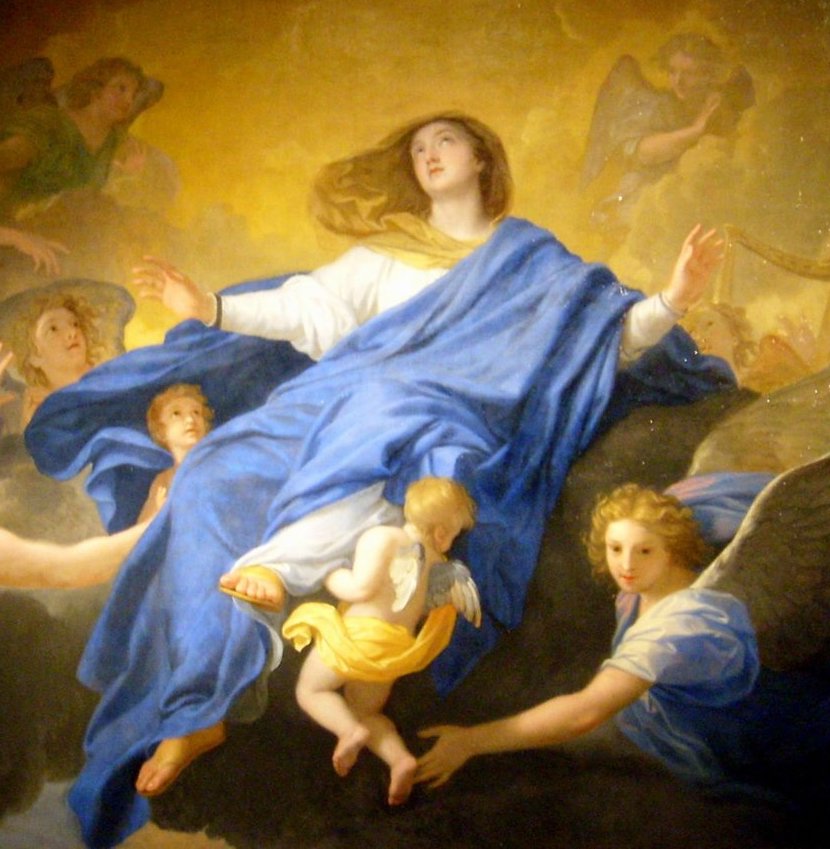In September, the Church celebrates Our Lady of the Seven Sorrows, who suffered so much during the passion of her Son. So, for this ninth1st Saturday of the Jubilee month, we meditate on one of the sorrowful mysteries: the crowning with thorns. What is the significance of this terrible passage of the Passion? First and foremost, the head is the seat of our thoughts, and here Jesus is going to atone for all our sins in thought. They take many forms. The first, the true root of all evil, is pride. It was at the root of Lucifer’s rebellion and of original sin. Today, pride has penetrated the whole of modern society, and we are all more or less responsible for it. Jesus, with His painful crown, came to repair this great insult to God.
Sins of the mind are also those invisible sins of which Christ spoke in the Gospel. Taking adultery as an example, He showed that we can commit many sins simply by thinking about them, without actually doing them. And this is just as serious in God’s eyes. Indeed, every sin is first and foremost a free and voluntary decision of our mind. And Jesus explained to us that it is this decision accepted in our mind that characterizes the offense committed against God. Silence, the absence of visible acts, etc. take nothing away from the reality of this rejection of God by our thoughts.

This is why all spiritual life requires us to work on strengthening our spirit. This is the fruit of this mystery. For this, the first means that all the saints have used is humility and consideration of our own weakness. ” All the perfection of the present life consists in recognizing one’s imperfections “, said Saint Jerome. ” Our strength lies in the knowledge of our weakness and the humble admission of our misery”, said Saint Augustine. Indeed, by placing our minds in these conditions, we rightly distrust ourselves, and understand the need for prayer and the sacraments to sustain us in the face of our human weakness. St. Philip de Neri prayed daily to God to watch over him: “Lord, watch over me today, for, left to myself, I’ll be sure to offend you.” And Saint Alphonsus de Liguori concludes: “To persevere in the good, we must not rely on the resolutions we have made, nor on the promises we have made to God. As soon as we rely on our own strength, we are lost. . It’s in the merits of Jesus Christ whom we must place all our hope to keep us in the state of grace.” So today, let us look at Jesus crowned with thorns and humbly ask him to help us in this necessary mastery of our spirit.
The second way is to prepare our minds even before temptation arrives, through prayer and penance. Saint Alphonsus de Liguori explains the benefits of such work: “It is very useful, in order to triumph in spiritual battles, to prevent them in our meditations, by preparing ourselves in advance to resist with all our might the attacks that maysurprise us. Indeed, training ourselves to refuse a temptation beforehand is much easier to do than when its seduction is there, and enables us to gradually strengthen our will. That’s why Jesus asks us in the Our Father to pray to resist future temptations. And in the Hail Mary we anticipate the final temptation by asking the Blessed Virgin for her help every day when we die, a help she will make even more powerful with the five 1st Saturdays of the month.
After atoning for the sins of the mind, the crowning with thorns has a second, very powerful meaning. Without realizing it, the executioners will bear witness to the Kingship of Jesus. Pilate would also later write on the sign on the cross: “Jesus of Nazareth, King of the Jews “. Finally, it was Jesus himself who affirmed this during his interrogation: “You say it, I am King” (Jn 18:37). And before his Ascension, Jesus will proclaim this Kingship in the true sense of the word: “All power has been given to Me in heaven and on earth. Go therefore and teach all nations. (Mt 28:18)”
A famous 19th-century cardinal, Cardinal Pie, made the following judicious comment on these words of Jesus: “Notice, my brothers, that Jesus Christ does not say all men, all individuals, all families, but all nations. “. The fact that Jesus Christ is not only King of our hearts and families, but also King of all nations, i.e. of all societies, is a reality taught by the popes. And it’s one of the most contested issues of modern times, because it’s essential. Pope Leo XIII explained it extremely clearly: “He who is the Creator and also the Redeemer of human nature, the Son of God, is the King and Master of the universe and possesses sovereign power over men, either individually or in society . The law of Christ must therefore be of such value that it serves to direct and govern not only private life, but also public life. ” Encyclical De Christo Redemptore, 1900.
Following in his footsteps, Pope Pius XI published the encyclical Quas Primas on December 11, 1925, instituting the feast of Christ the King. This year we celebrate the 100th anniversary of this fundamental encyclical:“It is obvious that the name and power of King must be attributed , in the proper sense of the word As the Word of God, consubstantial with the Father, he cannot fail to have everything in common with the Father and, consequently, supreme and absolute sovereignty over creatures. Pope Pius XI then recalled the words of the angel Gabriel, who attested to this Royalty:“Let us only recall the message of the archangel informing the Virgin that She will beget a Son, that to this Son the Lord God will give the throne of David, His father; that He will reign eternally over the house of Jacob, and that His reign will have no end.
Finally, Pope Pius XI concludes: “His [Christ’s] Kingship requires that the entire State to be governed by the commandments of God and Christian principles both in legislation and in the dispensation of justice, and in the training of youth in sound doctrine and discipline of morals”. And this is precisely what Satan sets out to destroy. Indeed, a Christian society whose government and laws conform to divine laws provides a powerful earthly framework to help souls get to Heaven. On the other hand, a secular atheist society, cut off from God, allows its laws to pervert men, separate them from God and lead them to Hell. Pius XI called secularism “the plague of our age” , and Cardinal Pius went on to say: “The dominant error, the capital crime of this century, is the pretension to remove public society from the government and law of God”. This is the famous “separation of Church and State”, a sophism that in reality eliminates God from society. Isn’t that the very definition of Hell? A place cut off from God.
The result is a host of evils, and man is gradually crushed by this atheistic society. During the1st World War, Pope Benedict XV said: “It is legal atheism, erected as a system of civilization, which has precipitated the world into a deluge of blood”. Yes, wars, genocides, persecutions, violence, social strife and totalitarianism are nothing more nor less than the direct consequence of having withdrawn our societies from the power and law of Christ the King.
So what’s to be done? Pius XI answered this question: “Do we want to work in the most effective way to restore peace ? let us restore the Reign of Christ . No peace of Christ without the reign of Christ. And he continues: “The day when States and governments make it their sacred duty to regulate themselves, in their political life, within and without, according to the teachings and precepts of Jesus Christ, then, but only then, will they enjoy a profitable peace within their borders. profitable peaceThey will maintain relations of mutual trust, and peacefully resolve any conflicts that may arise. Encyclical Urbi Arcano Dei Consilio, 1922. The Pope’s words are not utopian. Admittedly, on a human level, it seems impossible to restore the situation. But that’s precisely why Notre Dame is here!
Have we noticed this incredibly symbolic fact? On December 10, 1925, Our Lady came to ask for peace on the 1st Saturday of the month. The following day, December 11, 1925, Pope Pius XI published his encyclical on the Social Kingship of Our Lord. The message is clear: peace in the world depends on the return of Christ’s reign to our countries. And this return comes through Our Lady of Fatima, when we obey her request on the 1st Saturdays.
Author: Alliance 1ers samedis de Fatima pour la paix. www.jubile2025-fatima.org
A note on Jesus’ words in the Gospel about his kingdom
Two phrases from the Gospel concerning the Kingdom of Our Lord are often misinterpreted, and we’d like to shed some additional light on them outside meditation.
1/ “Render unto Caesar the things that are Caesar’s and unto God the things that are God’s”.
This phrase is sometimes perceived as indicating a separation between the State (Caesar) and God. Let’s take a look at how the Church teaches us to understand it. Every human being is both a temporal being living on earth and a spiritual being destined for Heaven. Here on earth, therefore, he will be subject to two distinct types of authority: the State and the Church. The aim of the State is to ensure the physical and moral well-being of all its citizens; to achieve this, it must implement laws in many areas, including the moral sphere, as Pope John XXIII explains: “The ‘common good’ which the State has to defend includes all conditions , including moral and spiritual conditionswhich help man to reach his ultimate goal, which is paradise”. Pacem in Terris.
The Church,” for her part, is a society distinct from the State, “perfect” in the sense that she has everything in herself to accomplish her mission, which is to lead souls to Heaven.” Leo XIII, Immortale Dei. The Church alone is entrusted with the task of dispensing God’s grace through the sacraments, and teaching faith and morals. The Church is therefore the general moral reference for both private and public life.
This shows that the State is indeed independent of the Church when it comes to ensuring the just material organization of society (rendering unto Caesar that which is Caesar’s), while the Church’s teaching is its point of reference for spiritual and moral matters (rendering unto God that which is God’s). Church and State are therefore neither “merged” nor “separated”, but “distinct” in their attributions. Both contribute together, in mutual respect and true collaboration, to setting a favorable framework on earth to help “man reach his ultimate goal, which is paradise.”
2/ “My kingdom is not of this world”.
This phrase is often taken to mean that Christ would not be King of the Nations on earth. Here again, let’s look at this in the light of Church teaching. God is an eternal spirit who made heaven and earth. His Kingdom is therefore spiritual and material, eternal, pre-existent on earth, and totally transcends the limits of our visible world, whether in essence, space or time. Consequently, His infinite Kingdom cannot come from this small, finite world of ours. But this does not mean that our world, which He created entirely, is not an integral part of His global Kingdom – quite the contrary.
Far from “excluding” our world from His Kingdom, Christ will on the contrary solemnly affirm His earthly Kingship: “All power has been given to Me in heaven and on earth. Go therefore and teach all nations. (Mt 28:18)”
3/ In conclusion
Let’s consider a third phrase Christ used when addressing Pontius Pilate: “You would have no power if you had not received it from above (Jn19:11).” . What does it mean? Christ guides men and exercises His power on earth indirectly by delegating it to human leaders. He will entrust spiritual power to popes and temporal power to heads of state, and He explains here that this power comes from God (and not from the people). As a consequence, and as with any principle of delegation, the “delegates” must exercise their power in submission to the One who delegates it to them. This applies equally to the Church and the State.
Author: Alliance 1ers samedis de Fatima pour la paix. www.jubile2025-fatima.org
